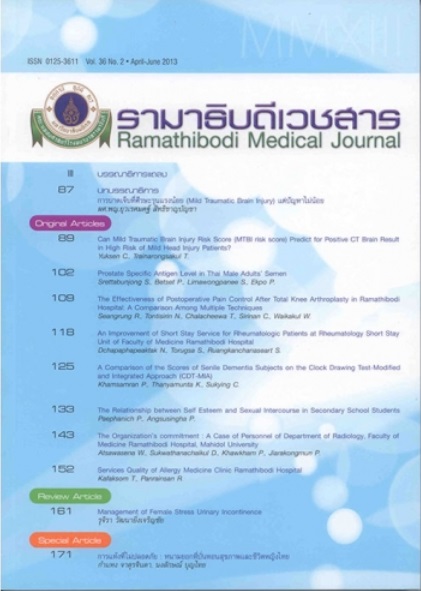Prostate Specific Antigen Level in Thai Male Adults' Semen
Keywords:
Age, Enzyme-linked immunosorbent assay, Prostate specific antigen, Semen, ThaiAbstract
Objectives: The purposes of this study were to determine the seminal PSA level in Thai male and to determine its association with the age of subjects and with the quantity of ejaculates.
Method: This study was an experimental research. Semen samples were obtained from the volunteers who signed an informed consent document approved by the Institution Review Board at the Faculty of Medicine Siriraj Hospital, Mahidol University. All voluntees were Thai healthy male adults aged 20 - 60 years without any recent acute illness/fever and were strictly asked not to have sexual intercourse/self-masturbation at least 5 days prior to semen collection. All samples were stored at -80 ํC shortly after being secreted from the volunteers' body until analyzed. The earlier reported ELISA protocol was used to perform the study.
Results: The semen samples were obtained from 17 volunteers with mean age 32.9 10.2 years (22 - 55 years) and mean semen volume 2.5
0.6 ml (1.5 - 3.5 ml). The seminal PSA concentrations were in the range of 503,636 - 519,090 ng/ml with the mean value of 513,502
4,211 ng/ml. The seminal PSA level was associated with the subject's age in negative correlation (r = -0.547, P < 0.01).
Conclusions: The mean seminal PSA concentration in Thai male adults was reported here. From the styudy, it was found that the PSA levels were decreased when the subject's age were increased, and the PSA levels were increased when the quantities of ejaculated semen were increased. However, further studies with a larger sample size may be needed to confirm these results as to a preliminary study.
References
Hara M, Inoue T, Fukuyama T. Some physico-chemical characteristics of gamma-seminoprotein, an antigenic component specific for human seminal plasma. Jap J Legal Med. 1971;25:322-6.
Li TS, Beling CG. Isolation and characterization of two specific antigens of human seminal plasma. Fertil Steril. 1973;24(2):134-44.
Sensabaugh GF. Isolation and characterization of a semen-specific protein from human seminal plasma: a potential new marker for semen identification. J Forensic Sci. 1978;23(1):106-15.
Ablin RJ, Bronson P, Soanes WA, Witebsky E. Tissue- and species-specific antigens of normal human prostatic tissue. J Immunol. 1970;104(6):1329-39.
Mauck CK. Biomarkers of semen exposure. Sex Transm Dis. 2009;36:S81-3.
Virkler K, Lednev IK. Analysis of body fluids for forensic purposes: from laboratory testing to non-destructive rapid confirmatory identification at a crime scene. Forensic Sci Int. 2009;188(1-3):1-17. doi:10.1016/j.forsciint.2009.02.013.
Talthip J, Chirachariyavej T, Peonim AV, Atamasirikul K, Teerakamchai S. An autopsy report case of rape victim by the application of PSA test kit as a new innovation for sexual assault investigation in Thailand. J Med Assoc Thai. 2007;90(2):348-51.
Levine B, Titus JM, Moore K, Fowler D. Use of prostate specific antigen in the identification of semen in postmortem cases. Am J Forensic Med Pathol. 2004;25(4):288-90.
Healy DA, Hayes CJ, Leonard P, McKenna L, O'Kennedy R. Biosensor developments: application to prostate-specific antigen detection. Trends Biotechnol. 2007;25(3):125-31.
Betset P, Srettabunjong S, Limawongpanee S, Ekpo P. The sensitivity of the detection of prostate specific antigen in semen by ELISA. Ramathibodi Medical Journal. 2012;35:70-8.
Graves HC, Sensabaugh GF, Blake ET. Postcoital detectionPostcoital detection of a male-specific semen protein. Application to the investigation of rape. N Engl J Med. 1985;312(6):338-43.
Wang TJ, Rittenhouse HG, Wolfert RL, Lynne CM, Brackett NL. PSA concentrations in seminal plasma. Clin Chem. 1998;44(4):895-6.
Schieferstein G. Prostate-specific antigen (PSA) in human seminal plasma. Arch Androl. 1999;42:193-7.
Dubé JY, Gaudreault D, Tremblay RR. The concentration of immunoreactive prostate specific antigen is not decreased in viscous semen samples. Andrologia. 1989;21(2):136-9.
Lövgren J, Valtonen-André C, Marsal K, Lilja H, Lundwall A. Measurement of prostate-specific antigen and human glandular kallikrein 2 in different body fluids. J Androl. 1999;20(3):348-55.
Kamenev L, Leclercq M, Francois-Gerard C. An enzyme immunoassay for prostate-specific p30 antigen detection in the postcoital vaginal tract. J Forensic Sci Soc. 1989;29(4):233-41.
Piironen T, Lövgren J, Karp M, et al. Immunofluorometric assay for sensitive and specific measurement of human prostatic glandular kallikrein (hK2) in serum. Clin Chem. 1996;42(7):1034-41.













